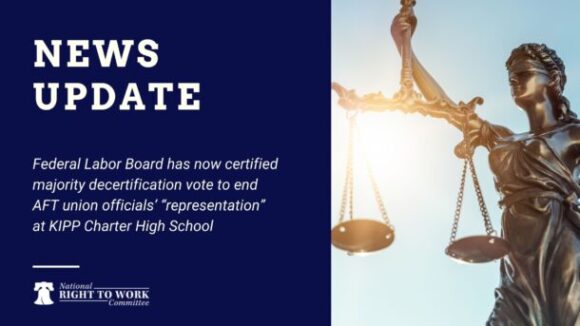Will Team Biden Weaponize Workers’ Pensions?
Big Labor abuse of worker pension and benefit funds as a means of advancing union bosses’ self-aggrandizing policy objectives is a familiar phenomenon.
Two worker witnesses testify in support of National Right to Work Act; Right to Work enjoys vast majority support among Americans

Washington, DC (November 30, 2023) – Today, Bob Good (R-VA), chair of the U.S. House Committee on Education and the Workforce’s Subcommittee for Health, Employment, Labor, and Pensions held a hearing on the National Right to Work Act (H.R. 1200).
The one-page bill, which is currently cosponsored by 117 members of the House of Representatives, would end Big Labor’s federally authorized power to force workers to pay union dues or fees as a condition of employment. Poll after poll demonstrates that 70% to 80% of Americans (or higher) consistently express support for the Right to Work principle that union membership and financial support should be the choice of every individual employee.
Testifying before the Subcommittee alongside National Right to Work Committee President Mark Mix were two employees who have successfully challenged illegal union boss practices with free legal aid from the National Right to Work Legal Defense Foundation.
Employees Share their Experiences with Illegal Forced Dues, Need for All Workers to Have Protection of Right to Work
Jeanette Geary is a retired registered nurse who in 2021 prevailed in an 12-year legal battle against the United Nurses and Allied Professionals (UNAP) union at the First Circuit Court of Appeals. Geary testified on how UNAP officials subjected her and her coworkers to an illegal scheme in which they were compelled to pay for union lobbying expenses.
“I wholeheartedly support the National Right to Work Act, so that no employee will be forced to pay his or her hard-earned money to a private organization they do not support,” Geary told the Subcommittee. “This is America, and membership in a union and payment of dues should be strictly voluntary.”
Also testifying was Philadelphia-based public defender Brunilda Vargas. Vargas recently won a favorable settlement after United Auto Workers (UAW) union bosses attempted to reduce the salary of her and other coworkers who opposed the union. Vargas shared with the Committee her experience with UAW officials’ threats and lack of responsiveness to worker requests.
“As attorneys, we do have a level of sophistication when it comes to the law and legal processes. However, I cannot imagine a lay person having to face this type of pressure. I believe that most people sign union membership and authorization cards because they believe they have no choice, and they are often told that,” Vargas testified. “If we had the protections offered by the National Right to Work Act, we would not have had to endure the harassment we faced.”
Right to Work Benefits Go Beyond Securing Worker Freedom
Aside from providing vital protections on American workers’ freedom of association, Right to Work also provides hefty economic benefits. In states that have enacted Right to Work, job growth and cost of living-adjusted disposable income are both substantially higher than Right to Work states’ forced-unionism counterparts.
“For too long, American legislators have turned a blind eye to American workers’ freedom of association in an attempt to enrich and empower their union boss political allies who flood the political system with cash and influence every single cycle,” commented National Right to Work Committee President Mark Mix. “Today, these worker witnesses told their firsthand stories of union bosses’ illegal abuses of their rights, and those watching should remember that their plight is shared by countless other workers across the country who are being denied the freedom of choice that Right to Work provides.”
“This hearing is a step toward ultimately passing the National Right to Work Act, which will finally remove compulsion from the core of American labor law and provide much-needed protections on worker free choice,” Mix added.

Big Labor abuse of worker pension and benefit funds as a means of advancing union bosses’ self-aggrandizing policy objectives is a familiar phenomenon.

What impact does handing a union monopoly power to deal with your employer on matters concerning your pay, benefits, and work rules have on your pay?

Federal Labor Board has now certified majority decertification vote to end AFT union officials’ “representation” at KIPP Charter High School